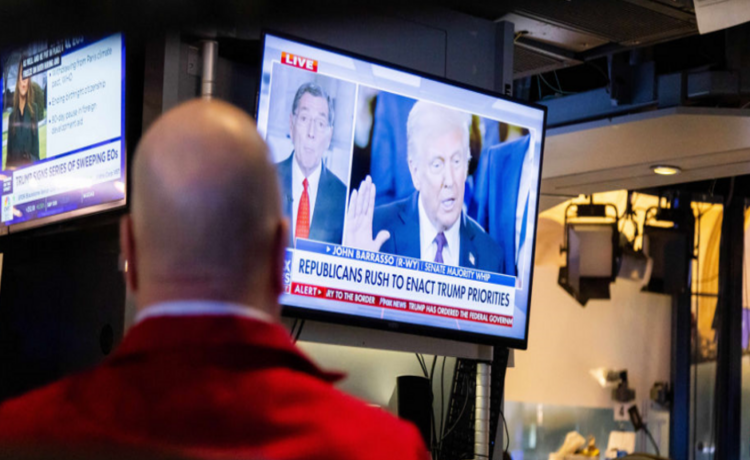Global stock markets rose on Tuesday, after US President Donald Trump stopped short of announcing new tariffs on his first day in office.
The three main US indexes ended the day higher, while shares in Europe and Asia also made modest gains.
While Trump did not announce widespread tariffs, he has ordered a review US trade deals, in a possible step toward the border taxes as well as threatening Canada and Mexico with 25% from 1 February.
The International Monetary Fund and analysts have warned that Trump policies threaten a significant disruption of global trade that could eventually backfire on the US.
But some of Trump’s policies such as cuts to government regulations are seen as positive for business.
The Dow Jones Industrial Average ended the day up 1.2%, while the S&P 500 climbed 0.8% and the Nasdaq rose 0.6%.
The dollar, which had fallen on Monday after the inauguration, swung up and down against some other major currencies, including the pound and the euro, as uncertainty lingered about what policies might become reality.
Trump had previously threatened new tariffs on Canada, Mexico and China on day one of his presidency. While they did not materialise on Monday, they are still on the agenda.
“We’re thinking in terms of 25% on Mexico and Canada, because they’re allowing vast numbers of people, Canada’s a very bad abuser also, vast numbers of people to come in, and fentanyl to come in,” Trump said in the Oval Office.
In a presidential memo, he directed federal agencies to investigate why America continues to import more goods than it exports as well as probing potential unfair trade practices and alleged currency manipulation by other countries.
Trump also said new tariffs on China could depend on whether a deal is reached over TikTok’s future. If Beijing blocked such an agreement “it would be somewhat of a hostile act”, he said.
But he said the US is not yet ready to impose tariffs on all imports into the country.
During the election campaign, Trump pledged a universal tariff of 10% and said he would hit China with a 60% import tax.
He has said tariffs will make Americans richer, although critics say the costs are likely to be passed on to consumers.
The president has also said he would create an “External Revenue Service” to collect all tariffs, duties and revenues from foreign sources.
In Europe, London’s FTSE 100 and Paris’s Cac 40 both closed marginally higher.
Danish offshore wind giant Orsted was a big loser, with its shares down as much as 17%, after announcing a $1.7bn (£1.4bn) impairment charge on delays to a US project and after Trump said he would end leasing to wind farms.
In the currency markets “plans and discussions of levies on Canada and Mexico saw those currencies fall sharply,” Fiona Cincotta, senior market analyst at City Index, told the BBC’s Today programme.
Oil fell on the prospect of more supply, and Bitcoin was higher due to Trump’s pledges of support for cryptocurrencies.
Tim Waterer, chief market analyst at financial services firm KCM Trade, said “market sentiment was dented during the signing of executive orders by President Trump in the Oval Office”.
“Investors heard more explicit details regarding the Trump tariff agenda, which sullied the market mood somewhat.”
Other analysts warned that Trump’s return to the White House will reintroduce an element of unpredictability in the markets.
“The first few hours of the Trump administration have underscored that policy environment will be dynamic once again and markets should brace for volatility,” said Charu Chanana, chief investment strategist at investment bank Saxo.
Trump adviser Judy Shelton said Trump’s “main priority is to re-energise the private sector”.
He wants to “unleash the individual through more economic liberty, through lower taxes, through less regulation”, she said.
She said tariffs were “a very effective negotiating tool” and it will be used “with our closest neighbours and largest trade partners Mexico and Canada” with regard to immigration.
She said tariffs would not necessarily be inflationary for Americans – people may not pay higher prices for imported goods, and instead turn to US producers.















